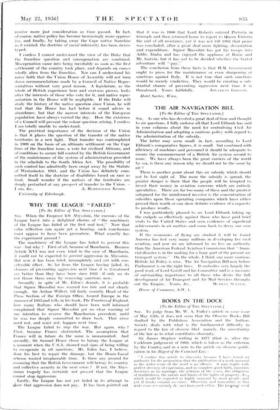WHY THE LEAGUE " FAILED " [7'o the Editor of
TnE SPECTATOli
Sm.— When the Emperor left Abyssinia, the enemies of the League burst into a delighted chorus of " the machinery of the League has failed at the first real test." Now that calm reflection can again get a hearing, such conclusions must appear to have been premature. What exactly has the experiment proved ?
The machinery of the League has failed to prevent this war—but why ? First of all, because of Manchuria. Because Article XVI. was not even tried in the case of Manchuria, it could not be expected to prevent aggression in Abyssinia. But now it has been tried, incompletely and yet with con- siderable effect. So far from the League having failed, its chances of preventing aggression next time it is threatened arc better than they have been since 1931--if only we do not throw them away by removing sanctions now.
Secondly, in spite of Mr. Eden's denials, it is probable that Signor Mussolini was warned too late and not clearly enough. Sir Arthur Willert, till fairly recently Head of the Press Section of the Foreign Office, toured Europe in the summer of 1935 and tells, in his book, The Frontiersof England, how many Italians who should have been well informed complained that Signor Mussolini got no clear warning of our intention to reverse the Manchurian precedent, until he was too deeply committed to draw back. That error need not, and must not, happen next time.
The League failed to stop the war. But again, why ? First, because France obstructed. The assumption that France will in future do the same is unwarranted. And secondly, Sir Samuel Hoare chose to betray the League at it moment when the U.S.A. showed real signs of being willing to co-operate in oil sanctions. Mr. Eden has. I believe, done his best to repair the damage, but the Hoare-Laval scheme wasted irreplaceable time. Is there any ground for assuming that the British Government will betray its country and collective security in the next crisis ? If not, the Abys- sinian tragedy has certainly not proved that the League cannot stop aggression.
Lastly, the League has not yet failed in its attempt to grow that aggression does not pay. It has been pointed out that it was in 1900 that Lord Roberts entered Pretoria in triumph and then returned home to report to Queen Victoria the end of all resistance, yet it was not till 1902 that peace was concluded, after a great deal more fighting, devastation and expenditure. Signor Mussolini has got his troops into Addis Ababa and has enjoyed the applause of Rome and Mr. Garvin, but it has yet to be decided whether the brutal adventure will " pay."
The conclusion from these facts is that H.M. Government ought to press for the maintenance or even sharpening of sanctions against Italy. It is not true that such sanctions would be merely vindictive. They would be creating a sub- stantial chance of preventing aggression next time it is threatened. —Yours faithfully. .lies.vrusx Hold .S'aeher, Wien.


















































 Previous page
Previous page